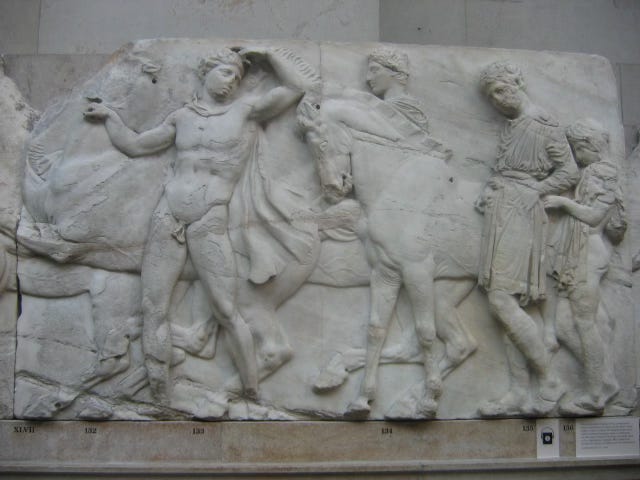The mountains look on Marathon
And Marathon looks on the sea;
And musing there an hour alone,
I dream’d that Greece might still be free.
George Gordon, Lord Byron, wrote those inspiring words more than 200 years ago as he awakened to the Greek cause of independence from the Ottoman Turkish Empire. Friday marked the 200th anniversary of Byron’s death from fever in a miasmatic army camp at Missolonghi before he had a chance to put his fervor into action.
One critic, safe at home, opined that Byron accomplished nothing in Greece except his own death. But Byron inspired the Greek patriots and promoted their cause to the rest of Europe. The poet singlehandedly created a special bond between Greece and England that still survives despite one of the most egregious acts of state-supported vandalism in history.
In 1801, Thomas Bruce, 7th Earl Elgin, serving as British ambassador at Constantinople, received [he claimed] permission from the Turks occupying Athens to strip the marble friezes from the Parthenon and send this booty back to England. He later sold the treasures to the government.
Though they had recently lost 13 North American colonies to independence, British colonial imperialism was on the rise. At the end of the 19th century, Kipling dubbed this “benevolent” extension of European mores “the white man’s burden.” The attitude was already well in place.
But not every Briton agreed with the premise that might makes right, and that the victors and their allies are entitled to cultural spoils. Lord Byron was one of the first to speak out against the theft of the Parthenon Marbles. [To refer to the friezes as Elgin Marbles justifies the despoliation.]
In 1811, after viewing the destruction on the Athenian Acropolis, Byron wrote “The Curse of Minerva,” in which Pallas Athena – patron goddess of the Parthenon – castigates the Byronic tourist for:
that blush of shame
Proclaims thee Briton
once a noble name.
Minerva, the Roman designation of Athena [educated Britons were steeped in Latin] points out that conquering Goths and Turks had respected her temple, but Elgin “basely stole what less barbarians won.” Yes, the supposedly cultured British proved themselves worse barbarians than those assigned that name.
The poet offered a lame defense:
Frown not on England; England owns him not:
Athena, no! thy plunderer was a Scot.
Unimpressed, Athena curses Elgin’s heirs and foretells the fall of the British Empire – though that happened 150 years later. She compares Elgin’s “sacrilegious lust” to that of Eratostratus, one of the most reviled of the ancient Greeks, who burned the Temple of Artemis at Ephesus [one of the original Seven Wonders of the World], to make a name for himself.
Elgin, she says, might even be the worse of the two, with his heirs to bask in the infamy of him:
Whose noblest native gusto is – to sell:
To sell and make – may shame record the day!
The state receiver of his pilfer’d prey.
Those pilfered friezes remain in the British Museum to this day, as does one of the caryatids – the maiden columns from the porch of the Erechtheion – also purloined by the British ambassador of bad will.
Greece has been calling for the return of this ill-gotten gain almost from independence though the clamor increased in the 1960s when actress Melina Mercouri, in her official capacity as Greek culture minister, made the campaign a cause célèbre.≈
“Formal talks” on the subject began in 2022. The idea of sharing the marbles has been floated, but the Greek response has been “to divide is to destroy.”
And many Britons agree. In 2022, actor Stephen Fry said, “It’s about time we move on from two centuries of bitter but sterile legal wrangling. It’s time we put our energies to an exchange.” His suggestion was to send the Parthenon marbles home and have the British Museum display some of the antiquities residing in storage.
“This would be a win-win for everyone,” Fry said. “The British Museum continues to be a leading museum of the world, while the Parthenon sculptures are reunited in their birthplace.”
Earlier in 2022, John Oliver declared: “The Marbles should absolutely be returned to Greece,” but he offered the caution that those friezes are only “the tip of the iceberg.”
The Greek Reporter indicated at that time that British King Charles III also favored the return of the marbles to their homeland.
How far an entrenched bureaucracy can lag behind the will of the people is evidenced by a 2022 Times of London poll which showed 78% of Britons thought the marbles should be returned to Greece.
Of course they should.
Photo: Wikimedia Commons








